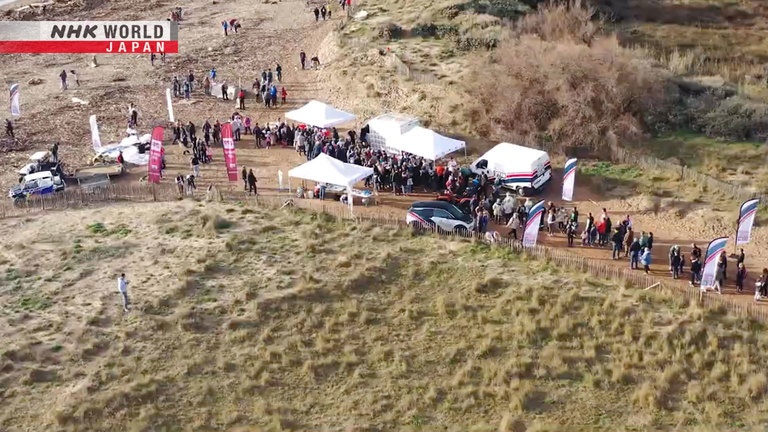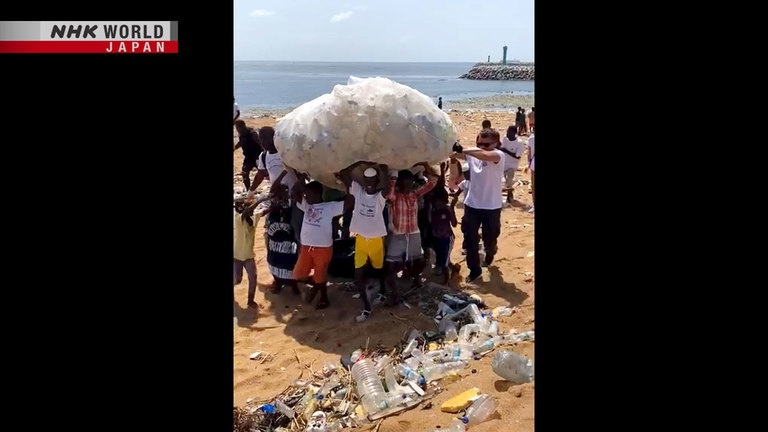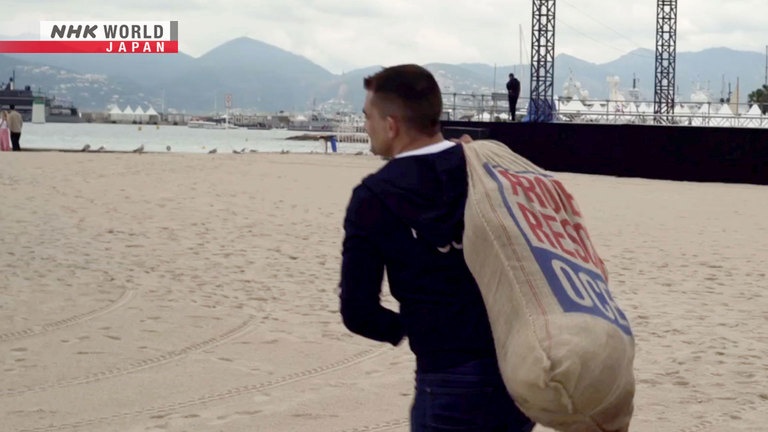Ocean Rescue Is Fun: Benoit Schumann / Director, Project Rescue Ocean
Benoit Schumann, a professional firefighter, founded Project Rescue Ocean to make citizens aware of the environment and to take actions.



Transcript
Direct Talk
A citizen's movement has been
launched on the beaches of France!
Every Sunday, an increasing number of volunteers,
joined by their families and friends, get together
in a convivial atmosphere
to collect waste that has piled up
before it eventually pollutes the oceans.
Initiated by the association Project Rescue Ocean,
these actions are led by the conviction of one man:
Benoit Schumann.
According to him, the solution has to do with
simply connecting back to citizenship and common sense.
Schumann wants to change mentalities
and to take action in a joyous and relaxed atmosphere.
Today we're in what we call the "Ocean Decade",
people talk about sustainable development goals,
but we all have to get involved in our own way.
We've got to stop saying:
"It's his fault or her fault, it's the politicians' fault."
We can change the world!
Ocean Rescue Is Fun
Born in the south of France,
Benoit Schumann grew up near the Mediterranean Sea
where he developed an unconditional love for the oceans.
Yet the increasing ocean pollution started worrying him.
Saving the oceans became his life mission.
I've always been passionate about being a firefighter.
When I was little,
every time I would see a fire truck go by,
I used to think to myself that
I would be in one of them one day.
At 18, I had the opportunity to become a firefighter
and I joined the Paris Fire Brigade.
It's a military institution,
thus meaning that I was really involved in protecting the capital,
whether fighting fires, helping people,
or looking after the environment.
So I've learnt what community living and team cohesion mean...
Those five years have been very beneficial to me,
I gained a lot of experience.
Benoit then decided to return to his native region.
Given the risks of floods and storms over there,
he trained as an underwater firefighter
and became a rescue swimmer,
carrying out numerous missions at sea.
While diving, I noticed that unfortunately
I would more often come across trash
as opposed to encounter sea breams, mussels, or other fish.
Soon I started feeling annoyed
by the way people would come to the beach,
enjoy the sun for hours, but then leave their trash behind.
The wind would blow it away and it would end up in the water.
So I started wondering
how I could raise people's awareness on that issue.
They were coming here on holiday
and probably didn't want to hear about ecology,
environmental issues, or waste while being on break.
So I started taking pictures with my cell phone.
I photographed all of the trash around me
and then posted the pictures on social media.
I tried to show people what it looked like.
Here's what's going on underwater.
Here's the state of the beach.
Yet I wasn't telling anybody off.
It was just about saying: "There you go, just look!"
In 2014, he set up a page on social networks:
Project Rescue Ocean.
It was such a success that Benoit felt encouraged to continue.
I decided to create a non-profit association
and to invite people to gather on the beach,
particularly after storms as I knew
waste would be brought in by big waves.
I tried to attract people by saying:
"Come this morning, let's get together,
it's Sunday morning, let's clean the beach!"
Quite unexpectedly, the public responded to Benoit's call.
They all shared his enthusiasm, optimism,
and desire to take concrete action on site.
Benoit funded all of the equipment
needed for these initial events himself.
I bought trash bags and gloves to give to people.
I said: "Let's get together,
we're going to pick up trash for two hours,
then we'll make a big pile of it, we'll take a picture,
and we'll post it on social media. Let's go!"
And so I started initiating events
like that on social media and it worked.
It worked because of that one single detail:
no moral lessons and no speech on the environment.
It was just about being responsible eco-citizens.
The events took place in a friendly atmosphere,
they included food and drinks,
and lasted no more than two hours.
Because we didn't want to turn into cleaners.
We're not cleaners.
I've got a job. I'm a firefighter.
I don't want to be a cleaner yet I can lead by example.
I can get involved.
A few years later,
The project had already built a solid reputation for itself.
An increasing number of volunteers
got involved in these festive clean-up events.
I then realised that people wanted to
get involved but didn't know how to.
They needed some kind of trigger.
They needed an event to attend,
where they'd be equipped to take action.
Today, when we talk about environmental issues,
everyone wants to get involved
but nobody knows where to start.
Because people are lost and confused.
Benoit does not get involved in any form of activism.
His slogan: "Less blah, blah, more action".
He prefers to insist on the positive
and friendly aspect of his actions.
That way, he has managed to
federate lots of different people around him:
his colleagues from the fire station,
his rugby team, his family, and his friends.
As everyone brought their own network
and know-how to the table,
the association gradually grew.
Soon he started organising these clean-up actions
all along the French coastline,
including along the Atlantic Ocean.
Members' donations allowed him
to structure and better organise the association
as well as to purchase the equipment needed in big quantities.
Right now, I'd say it's quite easy to
bring people together on a beach for a cause.
I can call the rugby players when they have a Sunday off
and tell them to come because there'll be beer.
They'll come for the beer and so they'll have to
take part and will start picking up waste too.
Then, if I want to gather student nurses for example,
I can just tell them that the local rugby team will be there
and so they'll all come to see the rugby players.
I, myself, will also come to collect waste and
I'll bring dozens, even hundreds of people with me.
That'll create a link around the cause.
That's why leading an action this way works well.
Plus, it also adds fun to the event,
so we get to kill two birds with one stone!
This approach not only has been working very well
but has also become particularly popular!
Indeed, while Project Rescue Ocean's clean-up actions
do always start with food and drinks,
they also often end with a big evening party,
meaning that people get to come together and bond.
Filled with enthusiasm, they celebrate
a day of carrying out concrete and useful action.
We're cleaning the beaches.
People gather together, there's a nice atmosphere,
music's playing. Great.
But how can we prevent this waste from
ending up on the beach or underwater?
And how can we make sure that later generations,
young people who enjoy swimming and diving,
get to see more fish and less waste?
The association came up with a
free awareness-raising session for children,
they told the children about how the water cycle works
and how cities' sewers and rivers end up in the oceans.
The children were then awarded an
`Ocean Saviour´certificate with their names on it.
7,000 certificates have already been awarded so far.
So we've developed Project Rescue Ocean Education,
with a committee and a director,
to set up a global awareness-raising programme
on civic spirit and common sense.
It's about encouraging people to take action
whether they pick up a single paper in the street
or collect a plastic bottle drifting in the ocean.
We've set up a team and created our own training course
meaning that wherever people are in the world,
once they've joined the association
and have had the training,
they can go to a school and speak
on behalf of Project Rescue Ocean.
This training is in the process of being accredited
by the French National Education system.
It's been recognised by UNESCO.
Our association is now a member of the UNESCO club.
This is very important to us.
It shows how serious we are and
how much we've improved in seven years.
It also shows that we're motivated
and that we'll be active in the long term.
And finally it shows that we've got
strong convictions and sound values.
Given the urgency of the situation,
Benoit continues to look for new ways to make an impact
and get everyone involved, even the most reluctant people.
First of all, I tried to collaborate with
the fishermen working in the Mediterranean sea.
It's a new generation of fishermen who talk about
environmental issues, plastic waste, etc.
But unfortunately, after heavy rains, their nets still end up
picking up as much waste as they catch fish.
So I started getting in touch with them
and thinking about what we could do together.
As divers ourselves, we invited
professional divers to go underwater
and take out the waste that the people on the quay could not see.
We started filling up the cages.
An hour later, the crane of the tuna boat lifted the cages
and in just 45 minutes we'd taken over
one ton of waste out of the water.
Benoit attended Cannes Film Festival
to carry out another public action.
One of his friends who is an actress wore
a unique dress entirely made of recycled fishing line.
Together, they strolled through the streets of Cannes
under the eyes of amazed festival-goers
and went all the way to the famous red carpet.
Then, Benoit offered one ticket
for the Tarantino film but with one condition:
someone had to come with him and observe
all of the trash that could be found on the beach.
Three years ago, we created Project Rescue Ocean Ivory Coast,
where we have a small team of people
carrying out eco-citizen actions.
Carrying out eco-citizen actions when 95% of the waste
is scattered across the lagoon is a very difficult task.
Benoit documented these actions
and posted contents on social networks,
trying to get reactions from people and institutions.
Reflecting Benoit's optimism,
this event soon turned into collective fun!
Despite the immensity of the challenge,
the association's branch in Ivory Coast
organises flash clean-up events every month on the beach
looking to raise awareness among the locals.
We won't manage to clean the beach by hand
because three or four waves later,
there's still as much waste as before.
So we got in contact with the UNESCO office in Abidjan.
We came up with a pilot project
which included training teachers so they can pass on
an eco-citizen awareness message to children
and award them our Ocean Saviour certificate.
The children celebrated their certificate and
clean-up effort of the day in their own way!
It seems obvious today to go to schools and
simply talk about civic awareness and common sense.
It's about going back to what our parents used to teach us.
Maybe that's what's been lost in our modern days and
we must bring it back to the table with simple eco-actions.
So, today we've got 40 branches both in France and beyond.
We've carried out over 268 actions in the field
and we've collected over 97 tons of waste
that won't end up in the oceans and
the seas thanks to citizens' actions only.
Betty Mazet
Communications, Project Rescue Ocean
We wanted to allow all of the people that had got involved,
even those who might have felt a little isolated,
to see the benefits of their actions.
So we created a mobile app that's very easy to use.
Benoit and I called it "Global Positive Counter."
It's a positive counter in the sense that it takes into account
all of the waste that won't go into the seas and the oceans.
So it's actually a really positive thing.
It's something that people can use
while walking in the forest, along the river
or the seashore, or as they get on with their daily life.
It's just great for everybody
to be able to add to this positive counter,
because it means that we can all engage.
This application's been running since September 2021
and we've been collecting lots.
Over 1,500 tons of waste won't end up in the oceans.
That's very concrete.
This is the story of a hummingbird putting out the fire.
We've been proving that it's possible.
Seven years ago, people laughed.
Then, they questioned themselves.
And now it's become obvious.
Today, we want to develop this app so we can provide
people who want to take action with the means to do so.
We've seen that everyone wants to engage,
but in their own way,
with their own means, and in their own time.
Some people have specific constraints while others don't.
Yet anyone can hold a burlap bag
and bend down to pick up a piece of waste.
That's the key!
"Together we can change our minds and become an example"
simply by getting involved
and showing that we can all have
our own role and change the world.